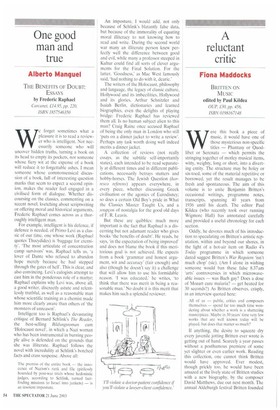reluctant critic
Fiona Maddocks
BRITTEN ON MUSIC edited by Paul Kildea OUP, £30, pp. 456, ISBN 0198167148 Were this book a piece of music, it would have one of those mysterious non-specific titles — Phantasy or Quodlibet or Serenata — which permits the stringing together of motley musical items, witty, weighty, long or short, into a diverting entity. The structure may be holey or six-toed, some of the material repetitive or borrowed, yet the result manages to be fresh and spontaneous. The aim of this volume is to unite Benjamin Britten's occasional writings, programme notes, transcripts, spanning 40 years from 1936 until his death. The editor Paul Kildea (who recently took over running Wigmore Hall) has annotated carefully and provided a useful chronology for each section.
Oddly, he devotes much of his introduction to speculating on Britten's artistic reputation, within and beyond our shores, in the light of a hot-air item on Radio 4's Today programme in which someone dared suggest Britten's War Requiem 'isn't much chop' (sic). (Am I alone in wishing someone would ban these false 8.37am 'arts' controversies in which microwaveable issues — was Bach gay? Does a dose of Mozart cure malaria? — get heated for 30 seconds?) As Britten observes, crisply, in an interview quoted here:
All of us — public, critics and composers themselves — spend far too much time wondering about whether a work is a shattering masterpiece. Maybe in 30 years' time very few works that are well known today will he played, but does that matter so much?
If anything, the desire to squeeze dry every juvenile jotting Britten ever wrote is getting out of hand. Scarcely a year passes without a posthumous premiere of some yet slighter or even earlier work. Reading this collection, one cannot think Britten would have approved. Ever modest, though prickly too, he would have been amazed at the lively state of Britten studies with a new biography, by the composer David Matthews, due out next month. The annual Aldeburgh festival Britten founded (with his partner Peter Pears) in 1948 remains one of our more eccentric June fixtures, ever reinventing itself yet still a homage to its first composer-director. Is there not a danger, a worried interviewer asked Britten in 1968, that this windswept Suffolk fishing village might become 'fashionable, like Glyndebourne'? Thankfully no place so awkwardly far from London, where the dress code is, of necessity, windcheater or head-to-toe coloured rubberised nylon, is in danger of catching glamour. Cliquey, yes. Serious, yes. Full of beau monde? Never.
Kildea's miscellany gives us the voice of the composer himself, with minimal mediation. A lucky-dip approach is recommended, since variety is provided by subject matter rather than literary distinction, which is not a strong point. Britten's prose is plain, four-square and correct. Always a reluctant and selfdenigrating writer, he neither strives for, nor stumbles upon, verbal arabesque or flight of fancy.
Inevitably his mode of expression is more relaxed in the radio transcripts. A chief pleasure is the manner in which these transient pieces give a snapshot of an England all but gone. The politeness is touching, stuffy, redolent of a postwar world of grey beef and gravy out of which Britten's music sprung, gleaming, inventive, invigorating. Had he only written Peter Grimes, we would still be marvelling. 'Was your private school in view of the sea?' asks one interviewer. Another wonders whether Britten has a favourite instrument. 'I notice, for example, that you employ the whip more frequently than other composers. . ."I wasn't aware of any predilection for the whip,' Britten replies.
His comments on great works of the repertoire are revealing. How worthwhile to read his thoughts on Purcell's Dido and Aeneas, Schubert's great String Quintet in C or Mahler's Fourth Symphony, to be reminded of his somewhat bad-tempered attitude towards Brahms or his incomprehensible resistence to Beethoven, notably the miraculous Piano Sonata Op. 111. The sound of the variations was so grotesque,' he observes, 'I just couldn't see what they were all about.' Even this most astute musical thinker, it appears, does not always get it right.
Some contributions are slim indeed. So on the death of Schoenberg in 1951 he dutifully comments:
I mourn the death of Schoenberg. Every serious composer today has felt the effect of his courage, single-mindedness, and determination. and has profited by the clarity of his teaching. The world is a poorer place now this giant is no more.
What did Britten, finally cool, elusive, enigmatic to outsiders, really think of Schoenberg? As so often in this book, we can entertain ourselves by reading between the breezy, widely spaced lines.



































































































 Previous page
Previous page